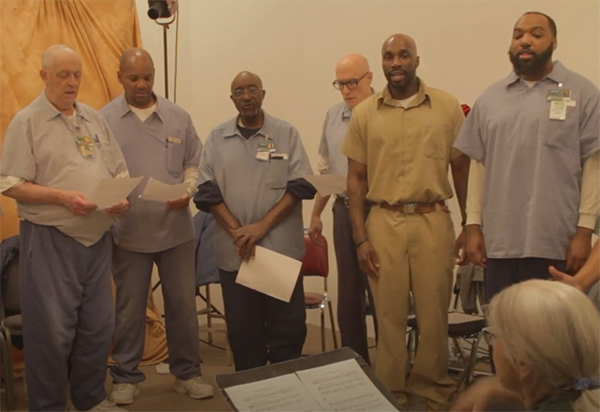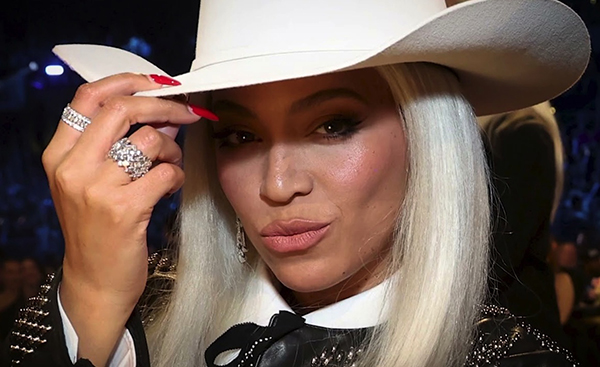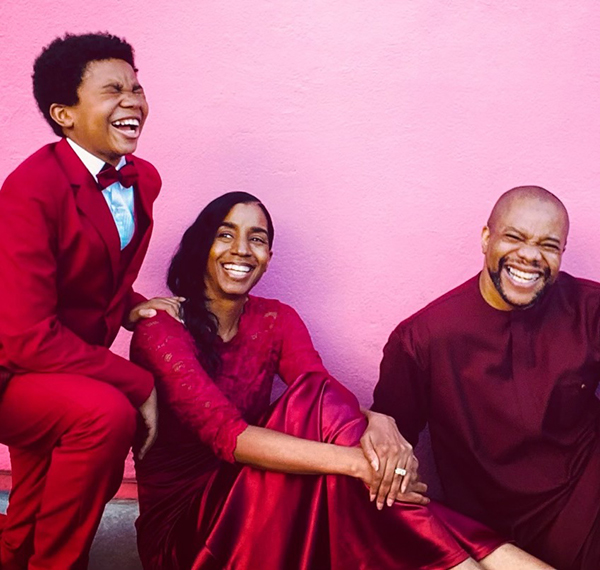By Darlene Donloe
Contributing Writer
LOS ANGELES — Michael (Blakk Sun) Powell learned how to sing opera, not at a music conservatory, but at the school of hard knocks — otherwise known as the Marion Correctional Institution in Ohio where he was serving a 20-year sentence for robbery.
As unlikely as it sounds, Powell, a former member of the KUJI Men’s Chorus at the prison where he sang Beethoven’s “Prisoners’ Chorus” from “Fidelio,” came to appreciate the art form even though, at first, he didn’t understand a word he was singing and was, admittedly, “bad at it.”
Once he understood the translation, Powell, 33, a songwriter, felt more of a connection to the material and sang it so convincingly he got noticed.
Powell, who went on to play Lafayette in a production of “Hamilton” at Marion Correctional, immersed himself so much into the music, that when he sang, he, ironically, felt a “sense of freedom.”
Today he is a free man.
The Mansfield, Ohio, native was released last May after serving 13 years and eight months of his sentenced. Reportedly, it was due to COVID-19, but Powell insists it was a judicial release because, he said, they realized his sentence was excessive.
Powell, a baritone/bass, is set to take part in Heartbeat Opera’s West Coast premiere of “Breathing Free,” a visual album taking place virtually Feb. 10 and 13.
“I don’t know anyone that has ever participated in opera in any form,” Powell said. “We don’t think we can do it. We can.”
Powell was tapped to participate in the production because he made a strong impression on Heartbeat’s artistic director Ethan Heard and musical director Dan Schlosberg when they visited a KUJI rehearsal at the prison in 2018.
Heard and Schlosberg are now behind a new musical called, “Breathing Free,” a celebration of blackness.
Presented by the Broad Stage, “Breathing Free” builds on Heartbeat’s 2018 collaboration with 100 incarcerated singers in six prison choirs, part of a contemporary “Fidelio,” composed by Heard and told through the lens of Black Lives Matter.
Powell will take part in the Feb. 10 “Breathing Free” panel, called “Voices of Incarceration.”
“I’ll be involved in a deep discussion,” said Powell. “I’ll be talking about being in prison and what it’s like coming out. I’ll be talking about the sense of accomplishment and freedom that comes with being in prison and being able to do something that reaches out here.”
Powell describes the show as “a videography about a lot of things.”
“What I took away was – what it’s like for you to walk within yourself and breathe free,” Powell said. “What does it taste like? What does it feel like? I lived a long segment of my life not knowing that. I had to learn that. I now identify with it.”
Powell was 18 when he decided to rob a store. He said he had moved from Mansfield to Columbus, Ohio, and had been sleeping on friend’s couches and his uncle’s couch and had grown tired of not having any money.
“I didn’t hurt anybody,” Powell said. “But I had a weapon. I had no prior criminal history. I got caught up following someone who didn’t have any direction. In prison, I saw that. I made a decision not to do that anymore.
“I thought my life was over with,” he said. “Life was about to get really real. I told myself to say goodbye to everything I knew. I wasn’t scared to go to prison, it was more shock.”
Prior to going to prison, Powell did 18 months in county jail.
“While there I had been preparing for going to prison,” Powell said. “I knew I was going. I was desensitized.”
Powell said when he heard the judge say he had a 20-year sentence, he “went numb.”
“I didn’t feel anything,” he said. “Older guys who have done more time told me, ‘Your mind hasn’t hit you yet.’ They were talking about my understanding that I had to do 20 years. It didn’t hit me until four years in how long of a sentence I had.
“It’s a sense of pain when you tell someone how much time you have and how much you’ve already done. It gets hard because you’re not the person you were when you went in, but you still have to be punished for it.”
Powell said he more scared when it was time to leave prison than he was when he went in.
“I was ready, but I was scared coming out,” he said. I worked for a number of years on my character and defined my confidence. While there, I didn’t do anything negative.
“Getting out, I would have to put that to the test. There is an element of failure. I didn’t want to fail and go back. Just the thought of getting out and not being who I thought I was is a scary thing.”
Powell said if he does anything wrong, the authorities can still send him back to complete the six years.
“Even if I wasn’t found guilty of anything, they could violate my probation,” Powell said. “I gotta walk with that every day. It’s pressure. I will never go back.
“Being ready to go and knowing you couldn’t was the worse. I’m never going back unless I’m going there to speak. There, I was inmate Powell. Now I’m Michael.”
Now that he is free, Powell, who has a full-time job with Healing Broken Circles, a company he worked with while in prison, is studying audio production.
“I just want to have a hand in some creation of music,” said Powell, a songwriter and recording artist who likes R&B and hip-hop. “Music is my thing. I like all kinds, which is why I’m involved with ‘Breathe Free.’”
Powell said he wanted to participate in the show because it would showcase talent that most minorities are not privy to.
“There are no big musical dance movements,” he said. “The interpretive dance is spot on. It’s done in a way to inspire you to have a different identification of someone who looks like me. This is part of who I am. I had to do it.”
Created in a time of George Floyd’s murder, the pandemic which is ravaging the prison population, and the 250th anniversary of Beethoven’s birth, Heartbeat has curated a song cycle brought to life in music videos, mingling excerpts from “Fidelio” with songs by Black composers and lyricists, which together manifest a dream of justice and equity.
“Breathe Free” features nine interconnected music videos with music from Beethoven’s “Fidelio,” Negro spirituals, and works by Harry R. Burleigh, Florence Price, Langston Hughes, Anthony David and Thulani Davis.
Each screening is followed by a live panel discussion with artists and advocates highlighting themes surfaced in “Breathing Free” relating to incarcerated populations.
The 45-minute “visual album” features three singers, three dancers, eight instrumentalists and a creative production team. Rehearsed remotely on Zoom, the cast recorded their individual audio tracks at home.
The presentation will be live-streamed. An audience question and answer session will follow the panels.
Darlene Donloe is a freelance reporter for Wave Newspapers who covers South Los Angeles. She can be reached at ddonloe@gmail.com.











